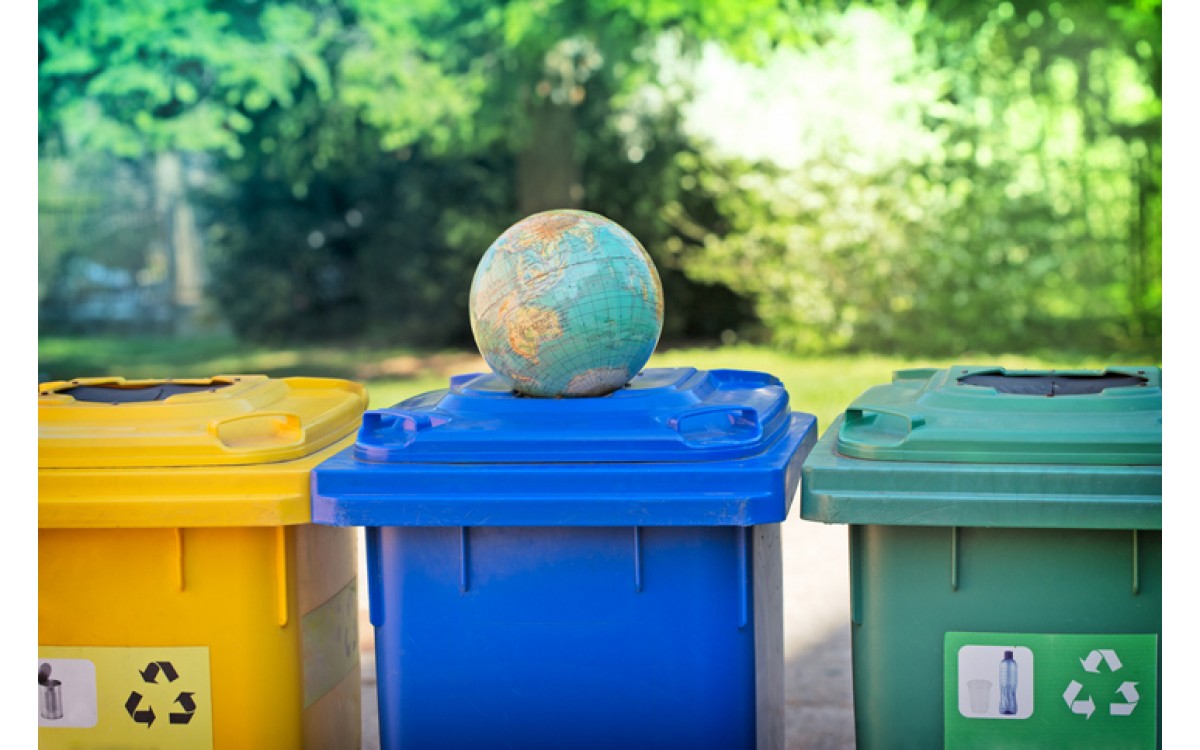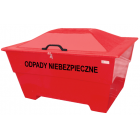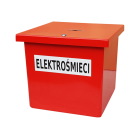The method of waste collection is strictly regulated by Polish and EU law. From the article, you will learn what PSZOKs and MPSZOKs are, and what kind of waste you can dispose of at these points. We will also suggest which solutions are worth using if you want to have daily management of problematic waste under control.
What is PSZOK?
This is an abbreviation for the Selective Collection Point for Municipal Waste. These waste collection points are directed to the residents of the commune, who can leave municipal waste there for free, conveniently and safely. PSZOKs are particularly focused on collecting problematic waste, which we cannot throw into private, household containers, e.g. dangerous substances, used toners, batteries.
Creating selective waste collection points is the duty of every commune - this is indicated by the Act of September 13, 1996 on maintaining cleanliness and order in communes. Some communes, in addition to the mandatory stationary PSZOKs, have also created mobile PSZOKs, i.e. MPSZOKs.
The locations of all waste collection points and their opening hours can be found on the commune's websites and/or we can find out about them at the office. From official sources, we will also learn more precisely, how to deliver waste and what rules apply to us in the PSZOK area.
Example rules:
- municipal waste can be delivered by passenger cars or cars with a light trailer,
- biodegradable waste is accepted loose,
- PSZOK employees do not help with unloading waste, except for hazardous waste.
What does PSZOK accept?
PSZOKs accept practically all waste from households, including:
- packaging made of paper, cardboard, glass, textiles, metals and plastics (regardless of their content, so even those that contain dangerous substances, corrosive or were contaminated by them),
- detergents (in the manufacturer's unit packaging);
- glass, wood, metal waste, textiles, clothing,
- pressure containers (after aerosols),
- used or expired fire extinguishers,
- used or expired engine oils,
- tires (bicycles, motorcycles, passenger cars),
- photographic reagents,
- paints, glues, inks, printer toners,
- adhesives and resins (also those containing dangerous substances),
- fluorescent lamps, fluorescent lamps, energy-saving lamps,
- mercury thermometers,
- refrigeration and air conditioning equipment,
- used electrical and electronic equipment,
- batteries, batteries,
- expired medicines,
- bulky waste,
- biodegradable waste (e.g. grass, leaves),
- waste not qualifying as medical waste resulting from the administration of medicinal products in the form of injections and monitoring the level of substances in the blood, in particular needles and syringes,
- waste from concrete, brick rubble, ceramics, tiles and terracotta, etc. - provided that they are municipal waste from self-conducted renovations.
We write in detail about the management of construction waste generated by economic entities here.
It is worth knowing that:
- expired medicines can also be given free of charge at any pharmacy,
- retailers are obliged to take back toners and household appliances from us for free when we buy a new product of the same type from them.
Remember: waste requiring packaging must be in a tight, undamaged package with the original label (it allows for reliable identification of the waste). The exception is food oils and gardening tools. We can bring these in replacement packaging without original labels.
PSZOK - what does it not accept?
The waste collection point does not accept primarily such waste, the type and/or quantity of which indicate that they were generated as a result of conducting business activity. Here, other regulations apply. That's why PSZOK will not collect from us, for example, biodegradable waste resulting from work carried out on behalf of the property owner on green areas that are common parts of the property.
This is what we will not leave in PSZOK:
- unsegregated mixed municipal waste,
- materials containing asbestos,
- roofing felt and construction styrofoam,
- waste in damaged packaging that causes the substance inside to leak.
PSZOK in Warsaw
In the capital, there are two stationary points for the selective collection of municipal waste:
- Zawodzie 1 (Wilanów),
- Płytowa 1 (Białołęka).
Both are open from Monday to Friday (14.00–20.00) and on Saturdays (9.00–20.00) except for statutory holidays.
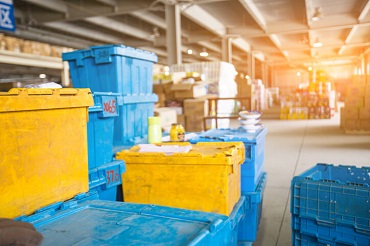
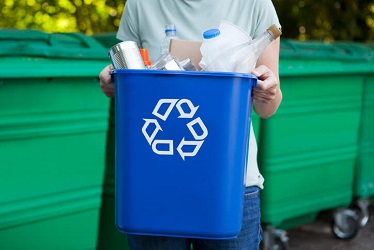
Mobile PSZOK, i.e. MPSZOK
Mobile waste collection points support the work of stationary ones. These are specially adapted vehicles that travel around the commune according to a predetermined schedule for a given calendar year. You can check the schedule and stopping places on the official commune websites or at the office.
We can give almost the same to the MPSZOK as to the PSZOK. However, there are exceptions.
What waste is not accepted in MPSZOKs?
These things you will not leave at the mobile point:
- construction and renovation waste,
- bulky waste,
- large used electrical and electronic equipment (over 50 cm),
- tires, bio-waste, mixed municipal waste,
- waste whose collection may violate EU ADR regulations (abbreviation for "Accord Européen Relatif au Transport international des marchandises dangereuses par route" - in English "European Agreement concerning the International Carriage of Dangerous Goods by Road").
In mobile waste collection points, roughly the same rules apply as in stationary ones, so it is not allowed to bring:
- waste in damaged packaging from which the substance leaks,
- unmarked waste, without the possibility of reliable identification,
- waste from business activity.
Remember that MPSZOK employees also have the right to refuse to accept waste if it does not comply with the rules applicable to a given point. In case of doubt, it is worth obtaining detailed information in advance.
MPSZOK stopping places in Warsaw districts
In Warsaw, there are 40 mobile points. MPSZOKs accept waste on Wednesdays and Saturdays in the following districts: Białołęka, Targówek, Praga-Północ, Praga-Południe, Rembertów, Wawer, Wesoła, Bielany, Żoliborz, Bemowo, Wola, Śródmieście, Ursus, Ochota, Włochy, Mokotów, Ursynów and Wilanów.
The exact schedule for the right-bank Warsaw can be found here, and for the left-bank here.
Recommended containers for hazardous waste from Eco 24
However, before we deliver waste to PSZOK or MPSZOK, we should take care of their safe, hygienic and convenient storage. Below we present proven containers that can be used in companies, shops, warehouses, public institutions or households.
Containers for batteries and accumulators
The certified container for batteries 680 L will work in car services, mechanical plants and many production processes. The most important features of the battery box:
- has a lockable flap,
- fits forklifts,
- is resistant to damage and harmful effects of chemicals,
- is made of smooth polyethylene suitable for recycling.
In plants, companies or shops, it is worth taking care of a safe, appropriately large container for batteries.
Container for used fluorescent lamps for companies and warehouses
Container for fluorescent l..
89.00 €
Ex Tax: 72.36 €
Hazardous waste container for your company
Hazardous waste container 220L - 450L is an effective wa..
269.00 €
Ex Tax: 218.70 €
Durable construction of hazardous waste container
Thanks to the use of special composites - polyes..
89.00 €
Ex Tax: 72.36 €
Container for used fluorescent lamps TUBA 60 - 180 cm
Hazardous waste container 220L - 450L
Container for electronic waste 65L









 Waste Containers
Waste Containers Waste Bins
Waste Bins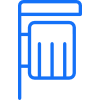 Street And Park Waste Bins
Street And Park Waste Bins Sand And Salt Containers
Sand And Salt Containers Hazardous Waste Containers
Hazardous Waste Containers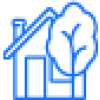 House And Garden
House And Garden Park Benches
Park Benches

